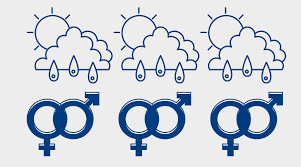Training course on Gender and Climate Change
Training Course on Gender and Climate Change Training is designed to equip participants with the understanding and skills necessary to address the intersection of gender and climate change.
Skills Covered

Course Overview
Training Course on Gender and Climate Change
Training Course on Gender and Climate Change Training is designed to equip participants with the understanding and skills necessary to address the intersection of gender and climate change. As climate change disproportionately affects women and marginalized groups, it is essential to integrate gender perspectives into climate action and policy-making.
Through interactive workshops, case studies, and practical exercises, participants will learn to analyze the impacts of climate change on different genders, develop gender-responsive climate strategies, and advocate for inclusive policies. By the end of the program, participants will be prepared to lead efforts that promote gender equality in climate action.
Course Objectives
- Understand the relationship between gender and climate change.
- Analyze the differential impacts of climate change on various gender groups.
- Develop gender-responsive strategies for climate action.
- Engage stakeholders in inclusive climate initiatives.
- Advocate for policies that address gender and climate issues.
- Evaluate the effectiveness of gender-inclusive climate initiatives.
- Identify best practices in gender and climate action.
- Address challenges in integrating gender into climate policies.
- Promote climate justice and gender equity.
- Foster collaboration across sectors for effective climate action.
- Build relationships with local government officials
- Establish corporate sustainability officers
- Enhance Gender research in climate change
Target Audience
- Environmental activists
- Policy makers
- Gender equality advocates
- Climate change professionals
- Community leaders
- Non-governmental organization (NGO) staff
- Researchers in gender and climate studies
- Educators and trainers in environmental issues
Course Duration: 10 Days
Course Modules
Module 1: Introduction to Gender and Climate Change
- Defining key concepts: gender, climate change, and intersectionality.
- Overview of global climate change trends and impacts.
- Understanding the gender dimensions of climate vulnerability.
- Historical context of gender in environmental movements.
- Setting course objectives related to gender and climate.
Module 2: Gender Analysis in Climate Action
- Techniques for conducting gender analysis in climate policies.
- Identifying gender-specific risks and vulnerabilities.
- Tools for collecting gender-disaggregated data on climate impacts.
- Case studies of gender analysis in climate initiatives.
- Ensuring ethical considerations in data collection.
Module 3: Gender-Responsive Climate Strategies
- Developing strategies for integrating gender into climate action plans.
- Identifying opportunities for gender-responsive adaptation and mitigation.
- Engaging women’s voices in climate decision-making.
- Best practices for gender-responsive projects and programs.
- Aligning climate strategies with gender equality goals.
Module 4: Stakeholder Engagement and Collaboration
- Importance of stakeholder engagement in climate initiatives.
- Strategies for identifying and engaging diverse stakeholders.
- Building partnerships for gender-responsive climate action.
- Facilitating inclusive discussions on climate issues.
- Gathering feedback from affected communities.
Module 5: Advocacy for Gender and Climate Policies
- Building advocacy skills for promoting gender-responsive climate policies.
- Strategies for engaging decision-makers and influencers.
- Communicating the benefits of gender equality in climate action.
- Utilizing media and social platforms for advocacy.
- Analyzing successful advocacy campaigns.
Module 6: Monitoring and Evaluation of Gender and Climate Initiatives
- Developing indicators for measuring gender impacts in climate actions.
- Tools for evaluating the effectiveness of gender-responsive initiatives.
- Reporting on gender-related outcomes and achievements.
- Adjusting strategies based on evaluation findings.
- Continuous improvement in gender and climate practices.
Module 7: Best Practices and Case Studies
- Reviewing successful gender and climate initiatives globally.
- Learning from international best practices.
- Identifying common challenges and solutions.
- Adapting practices to fit local contexts.
- Sharing lessons learned from field experiences.
Module 8: Climate Justice and Gender Equity
- Understanding the principles of climate justice.
- Analyzing the role of gender in climate justice movements.
- Strategies for promoting equity in climate-related policies.
- Engaging marginalized communities in climate discussions.
- Case studies of successful climate justice initiatives.
Module 9: Disaster Risk Reduction and Gender
- Examining the links between gender and disaster risk.
- Strategies for integrating gender into disaster risk reduction planning.
- Building resilience among vulnerable communities.
- Developing gender-sensitive emergency response plans.
- Analyzing case studies of gender in disaster management.
Module 10: Sustainable Development and Gender
- Understanding the relationship between sustainable development and gender.
- Integrating gender perspectives into sustainable development goals (SDGs).
- Strategies for promoting women's leadership in sustainability.
- Engaging youth and marginalized groups in sustainable practices.
- Evaluating progress towards gender and sustainability.
Module 11: Action Planning for Gender and Climate Initiatives
- Developing personalized action plans for gender-responsive climate action.
- Setting measurable goals for initiatives.
- Identifying resources and support networks.
- Creating sustainability plans for ongoing efforts.
- Sharing action plans and receiving feedback.
Module 12: Future Directions in Gender and Climate Change
- Exploring emerging trends and issues at the intersection of gender and climate.
- Collaborating across sectors for comprehensive climate action.
- Engaging future leaders in gender and climate initiatives.
- Long-term planning for gender equality in climate adaptation and mitigation.
- Building a community of practice for ongoing learning and collaboration.
Training Methodology
- Interactive Workshops: Facilitated discussions, group exercises, and problem-solving activities.
- Case Studies: Real-world examples to illustrate successful community-based surveillance practices.
- Role-Playing and Simulations: Practice engaging communities in surveillance activities.
- Expert Presentations: Insights from experienced public health professionals and community leaders.
- Group Projects: Collaborative development of community surveillance plans.